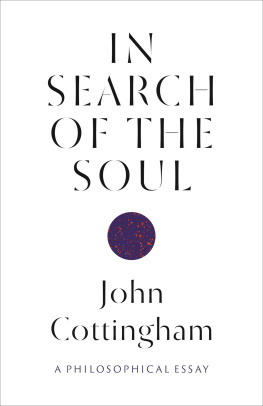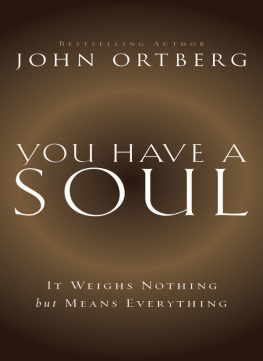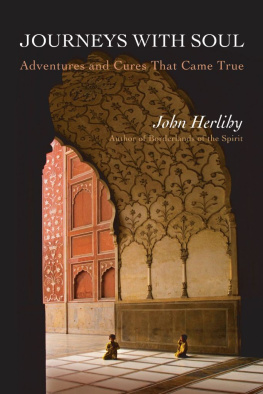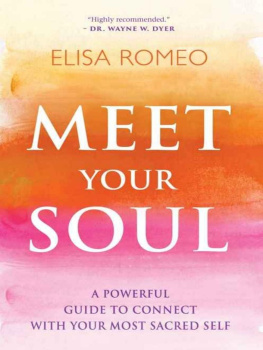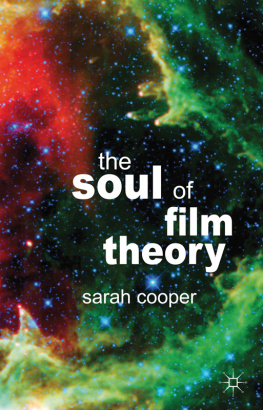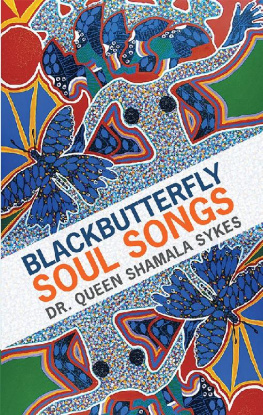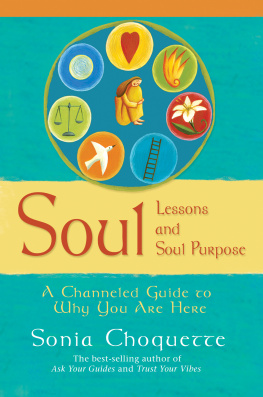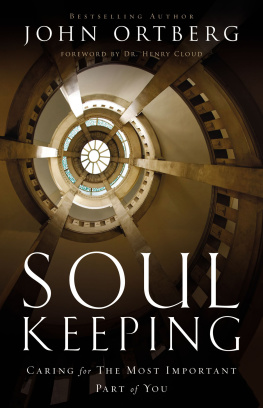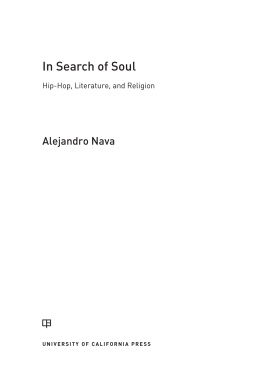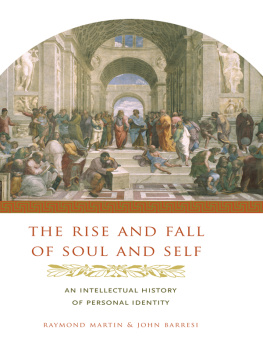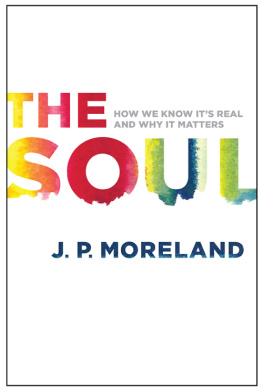IN SEARCH OF THE SOUL
IN SEARCH OF THE SOUL

John Cottingham
A PHILOSOPHICAL ESSAY
PRINCETON UNIVERSITY PRESS | PRINCETON AND OXFORD
Copyright 2020 by Princeton University Press
Published by Princeton University Press
41 William Street, Princeton, New Jersey 08540
6 Oxford Street, Woodstock, Oxfordshire OX20 1TR
press.princeton.edu
All Rights Reserved
Library of Congress Control Number: 2019937989
ISBN 978-0-691-17442-6
ISBN (e-book) 978-0-691-19758-6
Version 1.0
British Library Cataloguing-in-Publication Data is available
Editorial: Ben Tate and Charlie Allen
Production Editorial: Jenny Wolkowicki
Text design: Leslie Flis
Production: Merli Guerra and Jacqueline Poirier
Publicity: Jodi Price and Amy Stewart
Copyeditor: Maia Vaswani
Jacket design: Matt Avery / Monograph
For LWC, FJW, JTW, and HJC
CONTENTS
- ix
- 1
- 1
- 6
- 14
- 18
- 25
- 33
- 33
- 38
- 45
- 49
- 53
- 59
- 64
- 70
- 70
- 75
- 80
- 84
- 90
- 100
- 100
- 106
- 111
- 118
- 126
- 126
- 133
- 142
- 149
- 159
- 169
FOREWORD AND ACKNOWLEDGEMENTS
The notion of the soul has a long and problematic history, but perhaps surprisingly it has a power and resonance that are still very much alive today. As will be shown in the opening chapter, it is liable to occur in many different contexts, in literary and poetical writings, as well as in ordinary speech, when human beings speak about what matters deeply to them. It surfaces when people talk about the powerful human need to find our true self or identity; when they wrestle with the task of leading integrated and morally worthwhile lives; when they search for the love and affection that can give meaning to our existence, or the joy that arises from the sense of being at one with another human being, or in harmony with the natural world. So far from being the exclusive concern of theologians or historians of ideas, the concept of the soul, as I shall hope to show, is one that has a claim to be central to our thinking about what it is to be human.
Human life is a formidable challenge, but we are all necessarily engaged in the struggle to fulfil what is best in our nature, to realize our true selves, and thereby find meaning and completion. The picture of humanity in quest of the soul, as the first chapters title puts it, seems to mefor many reasons, which I shall be exploring in what followsa resonant and fruitful way of expressing this idea. Nothing, of course, compels us to use this terminology. Philosophical discourse is seldom if ever a matter of coercive argument, but has more to do with trying to show how certain frameworks of interpretation are hospitable to coming to terms with existential and moral challenges inherent in our human predicament.
The methodology and style in much of what follows connects with a goal that has increasingly informed my work in recent yearsnamely, to promote a more humane conception of philosophizing. While in no way discarding the technical tools of the professional philosopher such as abstract argumentation and analysis, whose value and importance are unquestionable, this approach is also ready to draw on the full range of resources available to the human mind, including those that depend on literary, artistic, poetic, imaginative, aesthetic, and emotional modes of awareness. Among the attractions of reflecting on the concept of the soul is that one cannot study it for very long without being drawn into contexts where all these varied modes of awareness are crucially important.
Socrates, the founding father of Western philosophical inquiry, described himself as having a special interest in the care of the soul, but I hope this modest volume at least manages to give some sense of how closely the personal and the philosophical aspects of the search are intertwined.
The topic of the soul touches on many areas of philosophy. In what follows the reader will find that questions are broached relating to moral philosophy (). The topic of the soul is one that demands treatment from many different angles, and it is part of my aim, in this as in much of my recent writing, to promote a broad, synoptic conception of philosophical inquiry, where one tries to see how different parts of our world view fit together (or clash).
Though all the five chapters of the book were newly conceived for this volume, in some of the sections I have made use of material from my earlier work, which I am grateful for being able to acknowledge here: in , Descartes, Sixth Meditation: The External World, Nature and Human Experience (in Descartess Meditations: Critical Essays, ed. V. Chappell [Lanham, MD: Rowman and Littlefield, 1997]).
In reflecting on the topics in the book I have incurred numerous debts to those who have taken part in various seminars and conferences and presentations over the years, most recently at the Centre for the Philosophy of Religion at Heythrop College, London, which sadly closed in 2018. Among the many friends and colleagues from whom I have learned much, special thanks are due to Fred Aquino, Clare Carlisle, Sarah Coakley, Brian Davies, Max de Gaynesford, Stewart Goetz, Philip Goff, Peter Hacker, John Kekes, Michael Lacewing, Simon May, Iain McGilchrist, Thad Metz, Anthony OHear, Stephen Priest, John Schellenberg, Roger Scruton, Eleonore Stump, Samantha Vice, and Mark Wynn. I am particularly grateful to Fiona Ellis and David McPherson for their friendship and philosophical insight, and for being kind enough to read the complete typescript and provide invaluable comments. Thanks are due to Dr. Matt Cottingham for helpful discussion of the scientists perspective. I should also like to thank Ben Tate of Princeton University Press for his encouragement, Maia Vaswani for her thoughtful and efficient copy-editing, James Curtis for his insightful indexing, and two anonymous readers for their most acute and constructive suggestions.
John Cottingham
West Berkshire, England
January 2019
Socrates, as reported in Platos Apology, 30b.
Nietzsche, Twilight of the Idols, Aphorism 4.
IN SEARCH OF THE SOUL
1
Humanity in Quest of the Soul
WAGNER. Alas, poor slave! See how poverty jests in his nakedness! I know the villains out of service, and so hungry, that I know he would give his soul to the devil for a shoulder of mutton, though it were blood-raw.
CLOWN. Not so neither: I had need to have it well roasted, and good sauce to it, if I pay so dear, I can tell you.
CHRISTOPHER MARLOWE, DOCTOR FAUSTUS
The Risk of Loss
In the legend dramatized by Marlowe and later retold by Goethe, Faust makes a disastrous bargain: he gains a great deal of power and pleasure but loses everything that truly matters. Anyone who thinks that the badness of the bargain hinges entirely on whether there really is an afterlife has failed to grasp much of the deeper significance of the story. Its perhaps unlikely that a dramatist today would write a play about selling ones soul, but even though the word soul may be less commonly found than it used to be, the underlying idea is very far from obsolete. Philip Pullmans acclaimed fantasy trilogy

